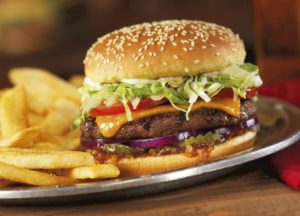Let’s Process This for a Minute

Perhaps you saw this in the news a couple of weeks ago: New evidence links ultra-processed foods with a range of health risks.
When I saw variations of this headline spill in through my news feeds, I immediately did my 1980’s best Valley Girl imitation…”Like, duh.” I assume that the lead researcher in this study was none other than Dr. Obvious.
What made me really scratch my head, though, was that most of these articles were accompanied by a photo of a cheeseburger deluxe with French fries.
Cheeseburger and French fries ultra-processed? Let’s break this down.
The cheeseburger consisted of one patty made from 100 percent meat (preferably bison) which consists of ground trimmings. Period.
The cheese goes through a bit more processing, but likely consists of milk, whey, yeast and salt. Then, there’s the lettuce, tomatoes, pickle and onion which are…well…lettuce tomatoes, pickle and onion.
The French fries? Sliced, fried potatoes. Agreed; they aren’t the epitome of health food, but deep frying doesn’t qualify as ultra-processed.
The bun may be considered highly processed, but I generally eat my bison burgers without a bun.
The authors apparently had difficulties identifying a specific product that would qualify as highly processed, so I am happy to help them out.
The best place to determine ultra-processed is to look at the ingredient panel for various types of food. Here’s one ingredient panel that caught my eye:
Water, textured wheat protein, coconut oil, potato protein, natural flavors, 2% or less of: leghemoglobin (heme protein), yeast extract, salt, soy protein isolate, konjac gum, xanthan Gum, thiamin (vitamin B1), zinc, niacin, vitamin B6, riboflavin (vitamin B2), vitamin B12.
Wait: That’s the ingredient panel for Impossible Burger®, the lab-created concoction being touted as the healthy, environmentally friendly alternative to meat. Not only is it ultra-processed, but the lab-created heme protein certainly qualifies as genetically modified, and the soy protein isolate is sourced from GMO soybeans.
How about this ingredient panel?
Pea protein isolate, expeller-pressed canola oil, refined coconut oil, water, yeast extract, maltodextrin, natural flavors, gum arabic, sunflower oil, salt, succinic acid, acetic acid, non-GMO modified food starch, cellulose from bamboo, methylcellulose, potato starch, beet juice extract (for color), ascorbic acid (to maintain color), annatto extract (for color), citrus fruit extract (to maintain quality), vegetable glycerin.
That’s the ingredient panel for the Beyond Burger®, another lab-created meat alternative. Making any food from cellulose from bamboo, refined coconut oil, and methylcellulose certainly qualifies that product as ultra-processed.
Perhaps the graphic accompanying the article wasn’t in error. Perhaps the authors just forgot to explain that the ultra-processed item in the picture was one of those laboratory-created burger “alternatives.”
